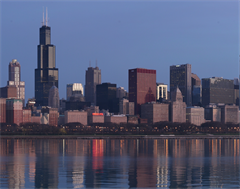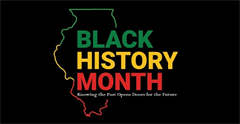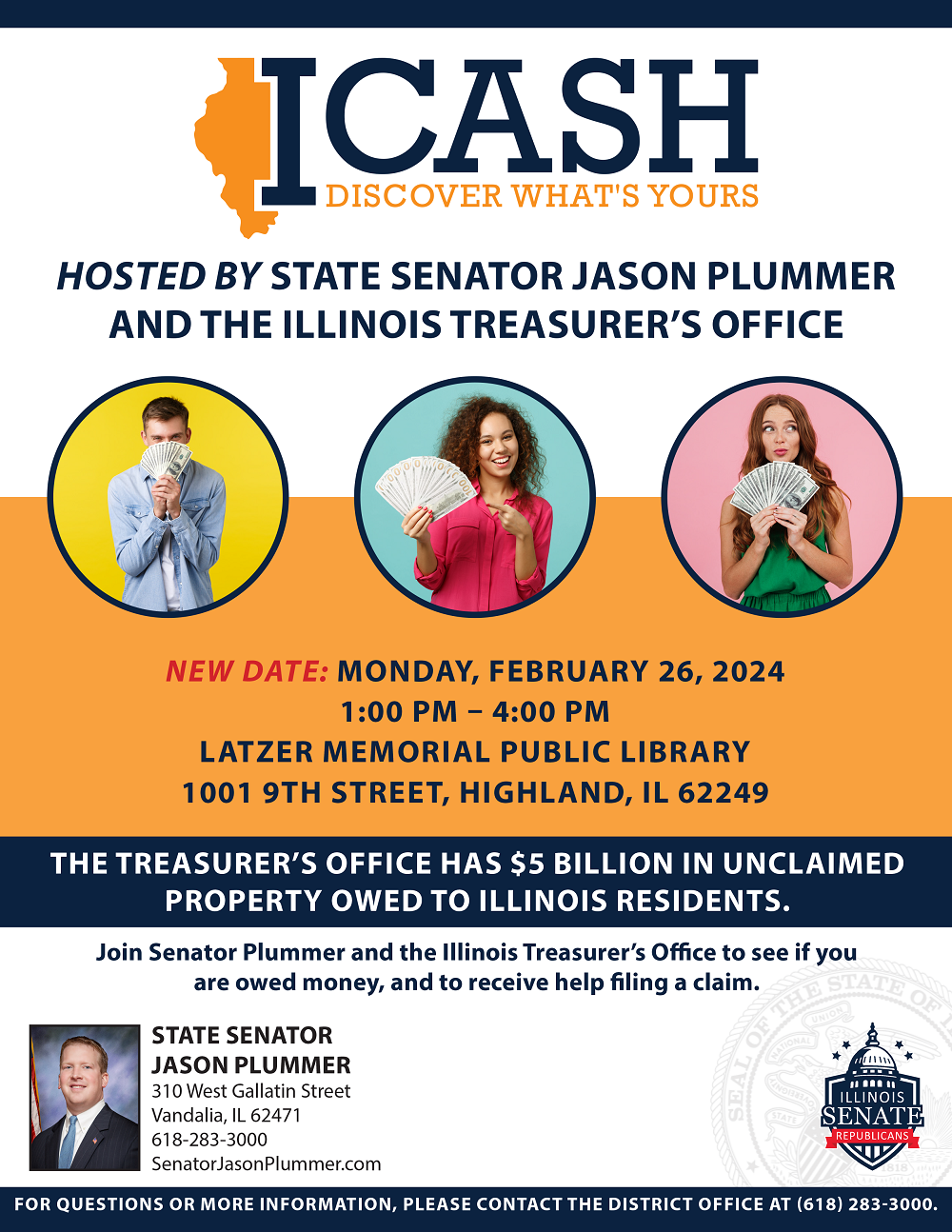| The Pritzker Administration presented lawmakers with their rules for charging copays in their program to provide free healthcare coverage for undocumented immigrants. However, Senate Republicans say it may be too late to have a significant effect on the costs of the nearly $1 billion per year program. Meanwhile, Senate Republicans are also working to address disturbing issues with the careless treatment of human remains in funeral homes. Illinois remains a hot spot for the film industry due to tax credit incentives, and improvements are in the works to improve statewide access to children’s behavior health resources. Black History Month is underway in the state, and a “Made in Illinois” grant program offers matching grant funding to small and mid-sized Illinois manufacturers. |
 |
| Senate Republicans Highlight Pritzker Administration’s Misplaced Priorities Over Free Healthcare for Migrants The three Senate Republicans who sit on the bipartisan and bicameral Joint Committee on Administrative Rules (JCAR) had an opportunity to question Gov. JB Pritzker’s Department of Health and Family Services (DHFS) officials last week over their program to provide free healthcare to undocumented immigrants. DHFS officials came to JCAR to present rules to begin charging co-pays to migrants in the program. During the hearing, the Senators learned that copays will be far more limited and vastly less expensive than traditional healthcare plans that most Illinoisans have. In addition, managed care providers can decide whether or not they will charge co-pays, with one of the largest providers in Cook County already announcing they will not. At the meeting, it was learned that mandatory co-pays will only exist for overnight hospital stays and surgical procedures. A group of Senate Republicans held a press conference later in the week, and highlighted the misplaced priorities that allow noncitizens to receive healthcare at nearly no cost while Illinoisans continue to pay hefty premiums and co-pays for the same services. The Senators explained how the free healthcare for noncitizens program has ballooned from an estimated $2 million to over $1 billion in just a few years. They also pointed out that Illinois taxpayers are not only paying premiums and co-pays for their own health insurance, but the taxes they pay are also covering the cost of healthcare for the hundreds of thousands of noncitizens who have come to Illinois. During the budget process last year, the Pritzker Administration claimed that they could keep the annual budget for the program under $550 million. At the JCAR meeting, DHFS officials admitted they were already over budget and announced the cost of the healthcare component alone would be in the range of $770 million this year, eclipsing the cost that was initially promised by nearly 50%. According to current estimates, total spending on all programs for noncitizens during fiscal years 2023 and 2024 is likely to exceed $2 billion. |
 | |
| Republicans File Legislation to Stop Mishandling of Human Remains In the fall of 2023, the Sangamon County Coroner launched an investigation into a funeral home and crematorium in Carlinville, Illinois, leading to allegations that the business provided more than 80 families with the wrong remains. Investigators added that some of the remains were likely permanently lost, and that the business improperly stored bodies, allowing them to decompose in unrefrigerated settings. Following the Coroner’s announcement, Republicans began drafting legislation to ensure the horrific events never happen again. Senator Steve McClure’s Senate Bill 3263 would make it a Class 4 Felony to knowingly and intentionally provide inaccurate documentation of the identity of human remains, store human remains in violation of Illinois law, or provide mis-identified human remains. The law would apply to all individuals authorized to treat, transport, or store human remains, which would include funeral homes and crematoriums. Identical legislation has been filed in the Illinois House as well. | |
 |
| Tax Credits Lure Moviemakers to Illinois Through a series of tax credits aimed at luring moviemakers to the state, Illinois has become a popular location for the motion picture industry. The General Assembly’s Illinois Film Production Tax Credit Act has been on the books since 2008, and a 10-year extension was approved last year. Since its inception, this tax credit has benefited the state’s economy with an economic impact of more than $6 billion. In the 10-year span from 2012 to 2022, Illinois averaged $404 million in direct expenditures by film studios. The International Alliance of Theatrical Stage Employees reported their membership for Illinois residents doubled during this time period as well. Senate Republicans continue to prioritize policies that help grow businesses and encourage investments in Illinois. |
 | |
| Statewide Initiative with Google Improves Access to Children’s Behavioral Health Resources The Illinois Department of Human Services (DHS) and Google Public Sector are partnering to create a new program called Behavioral Health Care and Ongoing Navigation (BEACON). The program includes a service portal for Illinois youth to help them access behavioral and mental health resources. BEACON will utilize Google’s cloud services to keep all information on the portal secure and accessible. The Division of Mental Health (DMH) at DHS will be spearheading this effort to centralize behavioral health resources for Illinois families. It is anticipated the program will benefit children and families that regularly engage with the Department of Public Health (DPH), the Illinois State Board of Education (ISBE), the Department of Children and Family Services (DCFS), the Department of Healthcare and Family Services (HFS), and the Department of Human Services (DHS). BEACON will rely on human-centered artificial intelligence and will serve as a preventive measure by intervening in children’s lives earlier to prevent further trauma from occurring. It will also help children learn positive ways to deal with and heal from trauma they have experienced. | |
 |
| Illinois Celebrates Black History Month February is Black History Month, and during this time each year we highlight the positive contributions African Americans have had on the country and state. Black History Month began as Negro History Week when it was created by historian Carter G. Woodson through his organization, the Association for the Study of Negro Life and History (ASNLH), in 1926. Woodson’s week was the second week in February largely due to noted abolitionist Frederick Douglass and former President Abraham Lincoln’s birthdays. From this it slowly grew into an unofficial month of celebration. This growth led to President Gerald Ford officially recognizing Black History Month in 1976 by imploring the public to honor the accomplishments of Black Americans. Since this initial proclamation, every President has endorsed a specific theme for Black History Month, with this year’s theme being “African Americans and the Arts.” The popularity of this idea has spread across the globe as Ireland, France, Germany, Canada, the United Kingdom, and seven countries in Africa now also celebrate Black History Month. |
 | |
| DCEO and IMEC Launch “Made in Illinois” Grant Program to Boost Manufacturing The Illinois Department of Commerce and Economic Opportunity (DCEO) is partnering with the Illinois Manufacturing Excellence Center (IMEC) to create the Made in Illinois grant program. A total of $1 million in funding has been allocated to this program, which will provide up to $50,000 in matching grant funding to small and mid-sized Illinois manufacturers. Through the matching fund grants, Illinois manufacturers can meet growing market demands and expand their businesses. To be eligible for the grants, companies must be operational in Illinois for over three years and employ between five and 250 people. This grant program will be accepting applications through March 31. For more information on the Made in Illinois program visit www.imec.org/madeinillinois | |
 |
 |

